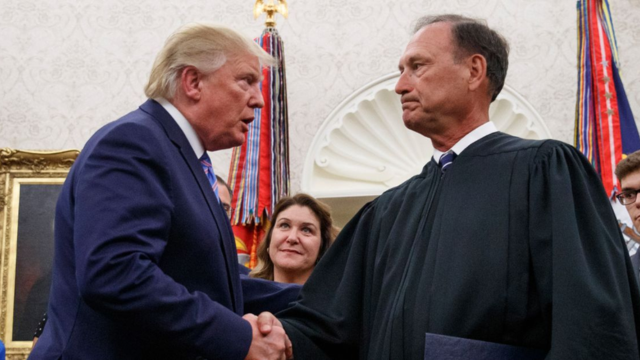In a fiery dissenting opinion released Saturday after the decision was made, Justice Samuel Alito said that the U.S. Supreme Court’s order to stop the Trump administration from carrying out certain deportations under the Alien Enemies Act (AEA) was “hurriedly and prematurely granted” and neither “necessary nor appropriate.”
The Court gave unprecedented and legally questionable relief in the middle of the night, without giving the lower courts a chance to rule, without hearing from the other side, within eight hours of receiving the application, with questionable factual support for its order, and without giving any explanation for its order,” Alito wrote in the vehement five-page rebuke.
Alito said, “I refused to join the Court’s order because we had no good reason to think that, under the circumstances, issuing an order at midnight was necessary or appropriate.” He pointed out that Saturday, Justice Clarence Thomas also did not agree with the order.
Alito said, “Both the Executive and the Judiciary have an obligation to follow the law.” “The Executive must follow the rules set out in our order…” and this Court should follow the rules that have already been set.
After the April 7 Supreme Court decision, which overturned a national injunction against summary deportations based on an obscure wartime law, the Saturday order and deportations case came up. It was turned down by all nine justices because the government wasn’t following the rules when it used the AEA.
The American Civil Liberties Union (ACLU) lawyers in Texas filed a motion for the writ of habeas corpus last week, which is a challenge to the whole “AEA Process.” They also asked for a temporary protection order and the court to recognise a class.
According to the country’s highest court, habeas corpus “has traditionally been a means to secure release from unlawful detention” and is “a means of contesting the lawfulness of restraint and securing release.” As part of the basic habeas standard, federal judges check to see if any detention goes against federal law or the U.S. Constitution.
The request for a restraining order was turned down by U.S. District Judge James Wesley Hendrix on Thursday. Hendrix was appointed by Donald Trump. Lawyers for the Department of Justice told the court that none of the claimants were in “imminent risk of summary removal” under the AEA. The court believed them. Hendrix said he would decide on the class certification move later. A quick interlocutory appeal was quickly filed by the ACLU with the U.S. Court of Appeals for the 5th Circuit on Friday. It was styled as an emergency request for a temporary blocking order.
That appeal was still going on when the plaintiffs went to the Supreme Court and asked for an emergency stay, as Alito pointed out on Saturday.
In his dissent, he said, “Just after midnight yesterday, the Court rushed and prematurely granted unprecedented emergency relief.”
Alito said, “The Court told [the Government] not to release a ‘putative class of detainees’ until this Court issues a superseding order.” It looks like the Court means all the people in the class that the habeas petitioners were trying to get recognised, which is “all noncitizens in custody in the Northern District of Texas who were, are, or will be subject to the March 2025 Presidential Proclamation entitled ‘Invocation of the Alien Enemies Act Regarding the Invasion of the United States by Tren De Aragua” and/or its implementation.”
Alito wrote in his dissent that he wasn’t sure if the Supreme Court had the power to make such a decision in the AEA deportations case because “the All Writs Act does not provide an independent grant of jurisdiction.”
Alito said, “When this Court rushed to enter its order, the Court of Appeals was thinking about the issue of emergency relief, and we were told that a decision would be coming soon.” “This Court, however, wouldn’t wait.” As per Rule 23.3 of this Court, an application for a stay will not be considered unless the requested relief was first sought in the proper court or courts below or from a judge or judges thereof. This is only done in the rarest of situations.
Alito said that the only papers sent to the Supreme Court were those that were made by the applicants. The justice said the court did not ask for or get a response from the government about the “factual allegations or any of the legal issues raised by the application.” It was also not possible for the Court to see a response from the government that was made in any of the lower courts, he said.
Alito says that when the applicants first brought their claims to the attention of the district court, Hendrix gave the government 24 hours to respond and was “ready to rule quickly.” The lower court didn’t have to answer because the lawyers for the applicants “filed their hasty appeal” with the Supreme Court. This, in the district court’s view, “deprived it of jurisdiction to rule,” Alito said.
Alito said that a DOJ lawyer in a different case told the U.S. District Court judge in charge of this case on Friday that “no such deportations” were being carried out by the government or “planned” to happen. This was another point of contention for the nominee chosen by George W. Bush. The Trump administration could not respond to the claims that deportations were about to happen.
“The papers before us said that the applicants were in immediate danger of being sent back to their home country, but they didn’t give us much evidence to support that claim,” Alito decided. “This Court has made it clear many times that an All Writs Act injunction can only be issued while an appeal is being processed if, among other things, “the legal rights at issue are clearly clear and, even then, sparingly and only in the most critical and exigent circumstances.”





More Stories
‘Midnight Ruling’: Justice Alito Slams SCOTUS for Halting Trump-Era Wartime Deportations
‘Midnight Ruling’: Justice Alito Slams SCOTUS for Halting Trump-Era Wartime Deportations
‘Midnight Ruling’: Justice Alito Slams SCOTUS for Halting Trump-Era Wartime Deportations